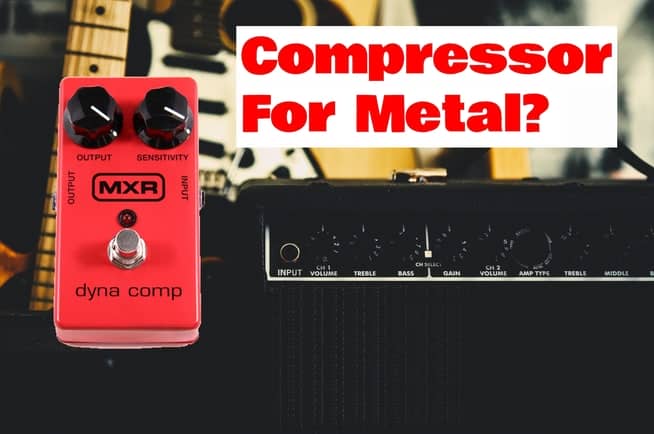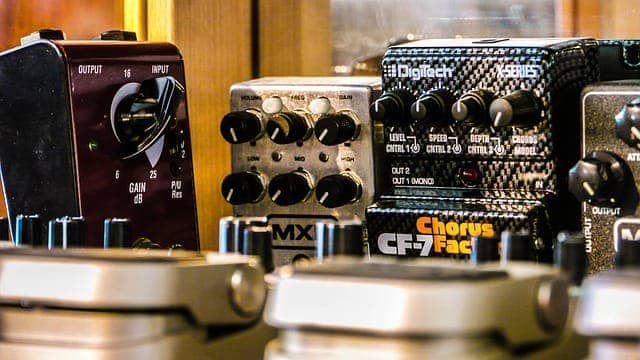
When crafting your desired metal pedalboard, the question will arise… do I need a compressor pedal? The answer is yes and no!
Granted a compressor takes far less priority over other pedals such as ‘distortion’, ‘EQ’, and a ‘noise gate’ for example. On the other hand, a compressor can be a valuable tool for enhancing your tone and overall sound, if you know how to use it.
A compressor is known for being effective for enhancing the dynamics from the range of clean single-coil tones, and mid-gain distortion tones.
However, compressors can be used in different ways for a metal set-up. Let’s look at the function of a compressor and the situations to how you could use it on your metal pedalboard.
What Does a Compressor Do?
In short, a compressor receives the loudest sounds from your signal, and reduces them, while taking the quieter sounds and increasing them.
Hence ‘compressing’ the dynamic ranges together. Essentially, it reduces the range of transience, compresses the dynamics, and levels the overall sound.
- Improves sustain
- Boosts lower dynamics
- Evens dynamics
- Evens playing volume
- Reduces attack transience
Compressor for High Gain Tones?
First, when playing metal, having a compressor on board is neither a necessity nor complete exclusion. At the end of the day, it all comes down to experimentation and personal choice when it comes to your gear.
Granted there are valid points for using and not using, I’m not going to judge either way! I’m here to discuss the points for both cases, so you can make an informed decision.
As always, I recommend experimenting as much as possible with your sounds and gear even with things that go against the normality.

Usually, a compressor is an overlooked pedal for metal tones for a few reasons.
The main reason is that high gain distortion combined with humbucker pickups, already creates a naturally compressed sound. Meaning adding further compression will do little to enhance the tone. Why add compression to an already compressed sound?
Secondly, a compressor used with a high gain distortion pedal or high gain amp can push the distortion too far and oversaturate a tone, making it sound muddy.
Although a compressor can round out the bottom-end, it can make a tone sound too buried (especially if you like tight mids) also adding a lot of unwanted noise in the process.
Who Should Use a Compressor?
A compressor is normally used for transparent clean tones, usually with single-coil pickups to increase the low dynamics of notes making them more audible, balancing the overall sound. This can benefit a country fingerstyle technique, using a combination of fingers and pick to pluck the notes.
There will be a range of dynamics and volume using this technique. A compressor will even out the attack transience and balance the subtle differences in dynamics to even out the sound.
Clean tones also tend to lack sustain meaning notes will decay quicker after the string is plucked. Using a compressor will allow the notes to ring out for longer while also adding warmth and character to the tone.
Why Use a Compressor for Metal Tones?
With my points discussed above, you may be disregarding the idea of using a compressor in your pedalboard. Not so fast! Even when using high gain, saturated a compressor can be used as a useful tool for a number of reasons…
Reason 1 – Even Sound Dynamics
An engaged compressor in the signal path will produce even volume projection regardless of whether you are playing metal lead or rhythm. Why is this important? The reason is that heavy detuned chords are louder than playing single-string solos, which is obvious because with chords you are using more strings.
Adding a compressor in the signal chain will reduce the attack transience of your notes, bringing them closer together in terms of attack and volume level. The compressor will, therefore, create less variance in volume when playing lead and rhythm and create a more fluid and smoother sound when playing high distortion.
This will benefit if you play alongside another guitarist. Mainly because having a stable volume creates more of a polished and professional sound when playing live, also making the guy behind the mixing desk job easier.
Having less volume variance makes gain staging and mixing live sound an easier process. It also has the added benefit of tightening up the loose bottom end dynamics of your tone.
Reason 2 – More Sustain!
On the subject of lead playing, the next reason is a compressor produces more clean sustain allowing the notes to be more audible which is useful for lead playing.
Granted distortion naturally creates compression, so a high gain distorted guitar will have lots of compression already. However, natural sustain doesn’t add any distortion allowing you to be heard better in the mix. It also does not affect the sound and dynamics of your tone.
Reason 3 – Clean Boost
Another way to use a compressor pedal for metal is to use it as a boost when playing lead. In my experience, when using a scooped high gain sound for metal, during leads you can interpret volume loss when playing solos, especially when alongside another guitarist playing rhythm.
This is the main problem myself and fellow guitarists face with this type of tone. I agree, there are pedals to boost your signal, however, some of them come with undesirable drawbacks.
The first option would be to add a boost pedal such as a tube screamer. However, adding a boost pedal before the gain, just produces more gain!
Which is undesired reducing the presence of the tone making it muddier and burying the overall sound in the mix. Adding mids to the tone boosts the signal, but it changes the dynamics and sound of your desired tone, losing that scooped mid sound.
Enter the compression pedal! When playing leads, adding a compression pedal in the correct spot in the signal chain can produce a clean boost to the signal without wildly changing the tone. It gives a nice natural boost which will lift the volume helping cut through the mix.
If you’re happy with the current amount of distortion on your tone, but just want a little boost for solos? A compressor can add more bite without adding any distortion and enhance the natural harmonics of your tone.
Wait! What about compressors for acoustic guitars? What are the benefits? This post will outline the reasons why you need a compressor for acoustic guitar.
In Summary
Although compression pedals are known for their effectiveness with cleaner tones, enhancing the sustain, clarity, and dynamics for country, blues, jazz, and playing rock.
However, do not rule out its usefulness and effectiveness for the heavier high-gain tones of metal. Adding a compressor to your board has many benefits and shouldn’t be an overlooked aspect when it comes to shaping and sculpting your ideal tone. Thanks for reading!
